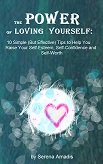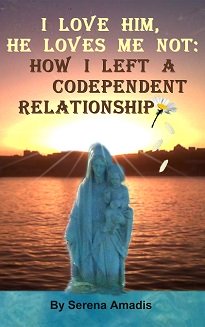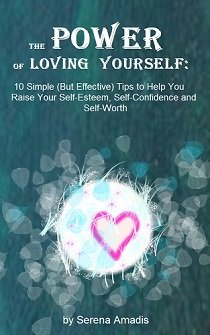Codependency in Relationships
I've found that I often tended to describe myself as the "Mother Teresa", I've-got-to-save-the-world, pick-up-poor-little-puppies type, and one day I just got a little fed up with myself and started to question: Why?
Why did I see myself that way, and act that way, and charge hither and thither
about in life with that kind of attitude?

Well, here is my take
on that subject.
What really bugs me about codependency in relationships, is that these are
relationships where people are giving up their own power, and refusing to
assume the responsibility for their own acts and decisions. Or they are
encouraging another person to do this, denying that person the opportunity to
face the consequences of their own acts and decisions and therefore to learn
from their mistakes and grow as people, as human beings.
So, what is codependency in relationships, and how do people end up in these situations?
I can understand why
people get trapped in codependency and codependent relationships. I can
understand where they are coming from.
However, I don't consider that a strong enough excuse to justify renouncing
your power, and refusing to take care of yourself.
I can understand that
it takes courage, and maybe a strong external support system, to put your life
back together and learn to stand up for yourself and take care of your
own interests, without feeling guilty about it.
All Human Beings Deserve Respect – And You Do, Too
It is hard to give up on a person that you love and care about, and acknowledge
that as long as that person has no interest in or intention of changing
themselves, becoming a better person who treats you with the respect and
dignity that you, as a human being, deserve, it isn't possible to share a
happy, healthy, fulfilling and beneficial relationship with that person.
But it is necessary to do something about that relationship, and about
yourself, who is after all the one who got yourself willingly into this
relationship to begin with.
Or do you want to be
beaten, trampled upon, battered, subdued, dominated, lorded over, denigrated
and subjugated for the rest of your life?
I may sound harsh, but I feel that, if you are in this type of relationship, it
is time for you to wake up!

So, what are the signs and symptoms of codependency in relationships that you should be looking out for?
Signs and Symptoms of Codependency in Relationships
Well, obviously, as these are truly unhealthy ways to relate to other people, one of the main signs is that you feel unhappy! You feel tormented, trapped, like you can’t live with this person but you also can’t live without him.
There’s no respect (or not much of it) in a relationship with codependency. It’s more like a hunter-and-needy person sort of thing. You might feel coerced in such a relationship, or as if the other person is taking away or restricting your freedom.
You might find yourself often describing your partner as “bossy”. If other people say negative things about your partner, you might find yourself getting defensive and justifying behaviours that, in reality, are NOT in the least bit JUSTIFIABLE or condonable.
Such behaviours might include things like, as I said before, not letting you have much freedom, counting how much time you spend away from him (or her) or outside your home, investigating into who you see, who you spend time with, who you talk to on the phone, etc.
Your partner might take your money away from you or limit the amount of money that you can have, even if you earn your own income. S/he might try and keep you from having contact with your family and friends. S/he might not want you to do things alone or with other people anymore, and might insist that you spend all your time with him!
Now, although all of these actions are obviously abusive, what makes it a codependent relationship, is the way that you feel about it.
Do you feel like you want to get away, but you can’t, because you feel guilty, or you think no one will ever want to be with you again because you’re not good enough for anyone else?
Are you, maybe, afraid
that if you leave your partner, s/he will never ever ever be able to climb out
of the deep hole that s/he’s in? Do you think that if you leave, and something
bad happens to him, it will be all your
fault?
False And Hollow Love
Once I may have felt pity for a person living in an abusive situation or putting up with codependency in his relationships, but I have seen too many unique, valuable and worthy people full of talent and love throw their lives away in the name of a love that is only false and hollow, and isn't real.
Their lives came to
nothing, and they made nothing of themselves. They kept all their gifts to
themselves, didn't do anything to help the world become a better place and even
worse, they refused to heal themselves.
Now, I realize that what we do with our lives is our own choice. And if we want
to throw our lives away, that is okay. If you do not accomplish in this
lifetime what you had planned on doing, you will come back.
The Creator's patience
is infinite (unlike the patience of human beings, like me!) and he will let you
return again and again and again, as long and as many times as it takes, for
you to learn your lessons and accomplish your goals and purposes.
But why subject yourself to the agony of, say, twenty more lifetimes on earth
trying to learn the same lesson over and over and over again, when you can get
it TODAY??
The Rescuer Type
Rescuer Types tend to go with codependent relationships like butter with bread.
These types of people tend to get themselves intricated into codependency and
dysfunctional relationships over and over and over again.
You might see this type referred to in codependency relationships as the “enabler”. The obvious reason, is that this is the partner who is enabling, or making possible, codependency and abuse in the relationship.
For as they say, no
one can kick you around if you don’t let them first.
So now, the solution?
Well, it's not all that easy. But Rescuer Type behaviours, beliefs and
attitudes are like addictions and just like addictions, they need to be
overcome slowly and with a great deal of professional help.
The first step, as happens with any addiction, is that the Rescuer Type must
recognize that s/he IS a rescuer type at all, and that rescuing tendencies are not
healthy and need to be healed!
This isn’t easy, but think of the rewards: no more codependency in your life
and loving relationships that nourish you instead, and help you to become the
best person that you can be. Greater freedom, greater strength in yourself and,
of course, the wonderful, empowering feeling of being able to say: I AM FREE TO
BE AND DO WHATEVER I WANT!
Remember when you were a toddler and you learnt how to do something for yourself, like dress yourself or stack up the blocks all by yourself? Remember how great that felt?
“Look, Mama, I can do
this all by myself!”
Once the Rescuer accomplishes this, this is already half the battle won – the
easy half!
Afterwards comes the
long and arduous process of becoming aware of the different kinds of thoughts,
beliefs and behaviours that comprise rescuing behaviour, and trying to change
these attitudes.
This isn't easy to do, but a habit of spiritual journaling is certain to help
along the way, by bringing automatic, self-sabotaging thoughts out into the
forefront and into awareness. After all, if you aren't aware that you are
thinking or doing something, you won't be able to change it!
And isn’t it worth it,
to be able to kick the codependency habit to the curb – forever?
Is It My Fault I'm A Rescuer?
The whole process is usually quite long and beyond the scope of this website.
It requires the help of a trained professional. Someone who can be there with
you, by your side, supporting you and advising you along the way as you bump
into difficulties, or meet up with things about yourself that you don't
understand.
Many counsellors
specialize in codependency or in treating people who find themselves in abusive
situations, and it could be well worth the bother to at least look into the
possibility of working with such a counsellor.
However, it might be helpful to note that, rescuers are made, not born!
In other words, you were not born a rescuer type.
The typical scenario is usually that of...... you guessed it! Rescuer Types, like
most other types, are usually formed in childhood.
And I guess you would be quite safe to suppose that Rescuer Types were probably
required or obligated to "rescue" someone when they were young,
usually a dysfunctional loved one.
Now, when I say that a person is "dysfunctional", I don't mean that
the person is a villain, a "bad" person, low life, sadistic or any
other such terms that might spring to mind. Dysfunctional people are usually
themselves the victims of some other dysfunctional person. And they learnt to
survive the only way that they could. But more on that later.
Of course, if it just so happens that the Rescuer Type is also a psychic empath, that can really make
life a mess!
Because then we would be dealing with someone who not only was required to
"rescue" someone beloved, but in addition, the rescuer could probably
feel all the pain of the “rescuee”. Which would only augment the sensation of feeling like you really HAD TO do something to help said
rescuee get out of pain.
The Accusing Type, Accusing in Order to Survive
The Accuser Type is usually the other half of a codependent relationship. (Of
course, I would recommend the caveat that you take everything that I say here
with a grain of salt. There are probably a million different types of unique
relationships in the world, so we can't really over-generalize about them all.
So I am merely talking about the majority, and the ones that I have
observed the most for myself.)
Just as you can’t have codependency without a “willing victim”, so you also can’t
have a relationship plagued with codependency if there isn’t another person
around with strong desires to prey
upon the willing “victim”, to twist that victim around his finger, manipulate
them and exploit their weaknesses.
These people also tend to be masters at emotional blackmail. Thus, you shouldn’t be surprised if you find the Accuser trying to make the Rescuer feel like the Accuser is the victim! And in truth, most Accusers really do believe that they are victims, and that the Rescuer is the one who is really using them.
But if someone stole your wallet or purse, would you then call yourself the thief? Just who stole from who, exactly? Did you steal from the thief?
So then, why would you let your Accuser make you believe that YOU are the one doing all the abusing, when it is obvious that it is S/HE who is actually pushing YOU around?
Accuser Types might seem like aggressive, belligerent bullies, and we won't deny that in their character, there is probably a tendency towards aggressive behaviour, or an instinct to lash out when under pressure, rather than to fold inwards, hide and protect oneself.
But once again, we are
usually talking about someone who was bred, not born.
How Are Accusers Made?
Of course we may take
two children and subject both of them to the same, dysfunctional childhood, and
perhaps only one of them will end up as the Accusing Type. And it is
true that a part of this is probably due to natural characters and inborn
tendencies.
However, if we took a child with a naturally aggressive character and raised
him in a loving and supportive home where a proper and moderate amount of
discipline is also practised, chances are, this aggressive child would find
productive, beneficial ways to channel all that energy as he grows up.
So, in the end, what I said before. That Accusing Types usually became that way
as the best means that they could find in order to deal with a bewildering,
precarious, dangerous and incomprehensible home or school (or other place where
the child spent a lot of time) environment.
Sometimes, Accusing Types become that way because an abusive loved one would
enlist the complicity of the child. Perhaps the child felt under the gun:
either I support and encourage loved one as s/he abuses other family members, or
I become the abused one.
Well, what would you do, if faced with this dilemma?
A more empathic type would probably prefer to suffer and receive pain rather
than cause pain (and thus turn into a Rescuer Type). However, not all people
are born with psychic
empathy.
This is not something that you can control.
So, the majority of people, not being psychic empaths, would probably choose to
join forces with the abusive loved one and abuse others, rather than receive
all that pain themselves. A pure question of survival.
And then there is also that shot of feel-good adrenalin that bursts through us,
when our abusive loved one smiles benignly down at us and tells us how well we
are doing, and that we are finally learning our lesson, or in general in some
way demonstrates his proud approval of us, when we join him in the abuse.
So there you have it, Rescuer Type and Accuser Type, the explosive cocktail,
the heads and tails that make up codependency in a relationship.
That Major "S" Word Once Again: Self-Esteem
The Rescuer Type was probably never taught to value himself and raise his
self-esteem, while the Accuser Type is just a scared child inside, still
needing to be rescued from some tragic past. So he looks to the Rescuer for
that salvation. And when the Rescuer disappoints, as will inevitably happen
someday, because no one is perfect and because Accuser Type usually has
unreasonable and perhaps unachievable demands and expectations, then Accuser
explodes, and takes it out on Rescuer, the same way s/he had learnt to deal
with these frustrating situations as a child.
So, is there no hope for a codependent relationship? To live a wonderful life
where codependency is no more?
Well, as I mentioned before, that is a task for the professionally qualified.
However, in general, although it may be very painful, difficult and
extenuating, generally Rescuer Types are more open to seeking a cure and a way
out. They want the pain to stop, after all. There is only so much pain that you
can suffer before you say: ENOUGH IS ENOUGH!
Accusers are less likely to seek help or admit that there is any problem,
because they tend to be more oblivious to their pain. They feel no obvious pain
and therefore lack the incentive to seek help or healing.
Of course, it is true, when they are arguing and fighting with their partner,
they feel pain. But that pain is short-lived, since Accuser usually wins the
battle.
And if Rescuer actually succeeds in arming himself with valour someday and
walking out on the relationship, well, sure, Accuser feels some pain. But s/he
will usually sublimate that pain by venting his rage on his ex-partner. And
that will make the pain go away and make Accuser feel better.
A simplistic view of the dynamics of a codependency pattern? Perhaps. But then,
this is actually a very complex subject, and whole tomes have been written about
it and even so chances are not all
aspects of this theme would be covered in an entire book.
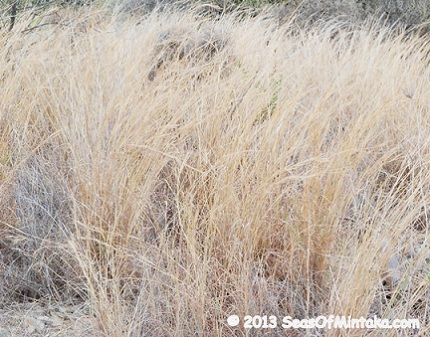
So here on this
website, the only thing I can offer is a brief summary and overview.
End This Cycle Now!
If you feel or suspect that you are involved in such a dynamic (ie. you are in
a codependent relationship, or you recognize strong codependency tendencies in
yourself, or you find yourself addicted to codependency in your relationships
and you’d like to get out but you feel like you can’t), if you see yourself or
identify with one or the other type described here, then I very strongly urge
you to get professional help.
Make an appointment with a psychologist. Or go to a counselling session, even
if it is a group session. Get yourself into some form of therapy with a
qualified professional. Or find a 12-step program aimed at abusive, dysfunctional
or codependent relationships in your part of the world, if they exist.
Once I met the most wonderful professional, a really profound psychologist and
counsellor, and he described for me in great depth the dynamics of the cycle of
abuse, in a way that made it most clear even to someone like me who was most in
love with an abusive person at that time, and therefore didn't really see him
with objective eyes. Perhaps one day I will share this magnificent person's
knowledge with you here on this website, as it is really life-changing and
something that everyone living in an abusive relationship, or who suspects that
they have codependency behaviour, ought to know about.
It's Time to Rescue Someone: Yourself!
Okay, codependent Rescuer Type. Do you still need someone to rescue? A lost cause,
a mission, to make your life feel worthwhile and appease your sense of guilt
and your need to be needed? Well, then, it's time you rescued someone else, the
most important person in your life: YOU!
Leave your Accuser Type partner there, it's high time s/he picked up after
himself and looked after himself. Yes, s/he needs help, just like you do, but
it's not YOUR duty to rescue him. At some point in his evolution, he has to
learn how to rescue himself, too.
Just as YOU also have to learn how to rescue – YOURSELF!
If you liked this article, you might be interested in not only reading more articles on this site, but also receiving all new articles in your email and reading them before anyone else does. You can enjoy that privilege by signing up to Follow My Site or subscribing to the RSS feed. You can sign up in the box on the upper right-hand corner of this page.
If you liked this article you might also enjoy:
Learning How to Manifest Good Things
Listening to and Following Your Intuition
Seas Of Mintaka Psychic Empowerment Blog

If you like my site and found that it has helped you, consider leaving me a donation to help me pay for hosting so I can keep the site running. And thank you sooooo much! All my love!
FREE DOWNLOAD!
Did you enjoy this article? Would you like to be the first to receive all my new articles in the comfort of your own Inbox? Subscribe to my Newsletter, where I send out all my new articles FIRST to my Beloved Subscribers. And receive the option to download a FREE EXCERPT from my ebooks, "The Power of Loving Yourself" and "I Love Him, He Loves Me Not: How I Left a Codependent Relationship", as a token of my appreciation for SUBSCRIBING to the newsletter.
You can Subscribe in the box on the top right-hand corner of this page. ------->
If you enjoyed this article you might like to check out my Thrillers, here:



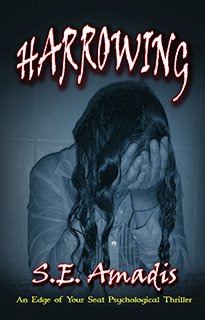

Take a look over my ebooks too, here:
comments powered by Disqus
FREE DOWNLOAD
Sign up to Follow this site and receive my Live Your Dreams Today Newsletter in the comfort of your own Inbox
And as a bonus, receive the option to download FREE EXCERPTS from my ebooks as a free gift from me, to show you my heartfelt appreciation for signing up to Follow My Site
(PLUS an Extra Chapter that is ONLY AVAILABLE for my Beloved Subscribers!)
(You won't find it anywhere else!)
(Sorry it's so long, GDPR you know.)
Your email address is totally secure. We promise to use it ONLY to send you the occasional newsletter and we will never reveal your email address to anyone. You can unsubscribe at any time by clicking the link in the footer of our emails. To read our privacy practices, click the link in the footer.
If you like my site and found that it has helped you, consider leaving me a donation to help me pay for hosting so I can keep the site running. And thank you sooooo much! All my love!
Ebooks by moi available on Amazon:
I Love Him, He Loves Me Not: How I Left a Codependent Relationship

All images and graphics on this site are mine, either taken by me, designed by me or used with licence or permission of the owner. If you wish to copy and use any of these images on-line you may do so, but please provide a credit and a link back to my site. Linking the image itself, without text, is also acceptable.
Disclaimer: I do occasionally have affiliate links on this website. However, they are only for products or services that I myself have purchased, used and believe in. I will only ever endorse products and services that I myself have purchased, used and believe in. So if in the end you feel you would like to buy these products or services, I’d feel real chuffed if you’d buy them through my links here on this website. It won’t cost YOU any more, and it will benefit ME, the sellers of these products and services, and everyone else involved.

